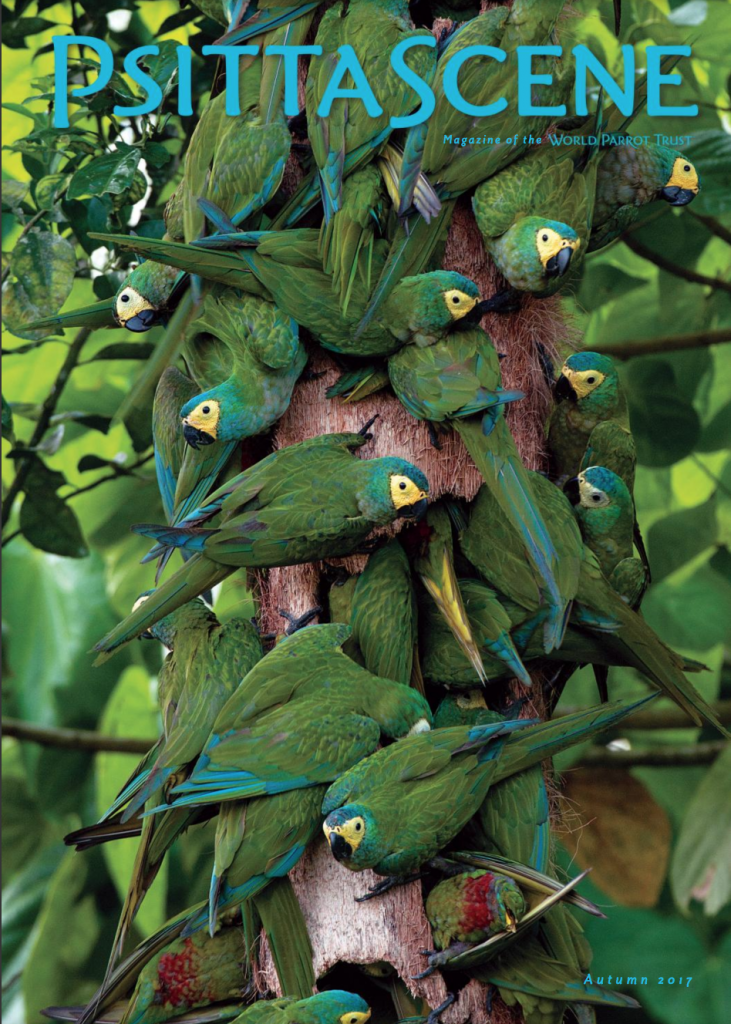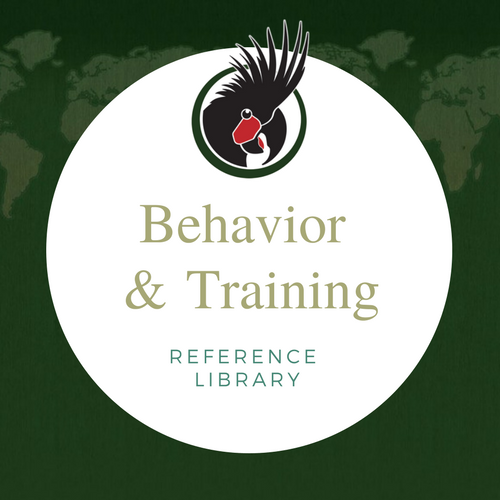
Why Adoption Makes Sense
An Interview with Ann Brooks of Phoenix Landing
Companion parrots can be long-lived. The sad reality is that many parrots will outlive their caregivers and need access to a succession of good homes. One way to help companion parrots is by educating people on their welfare issues, and encouraging adoption.
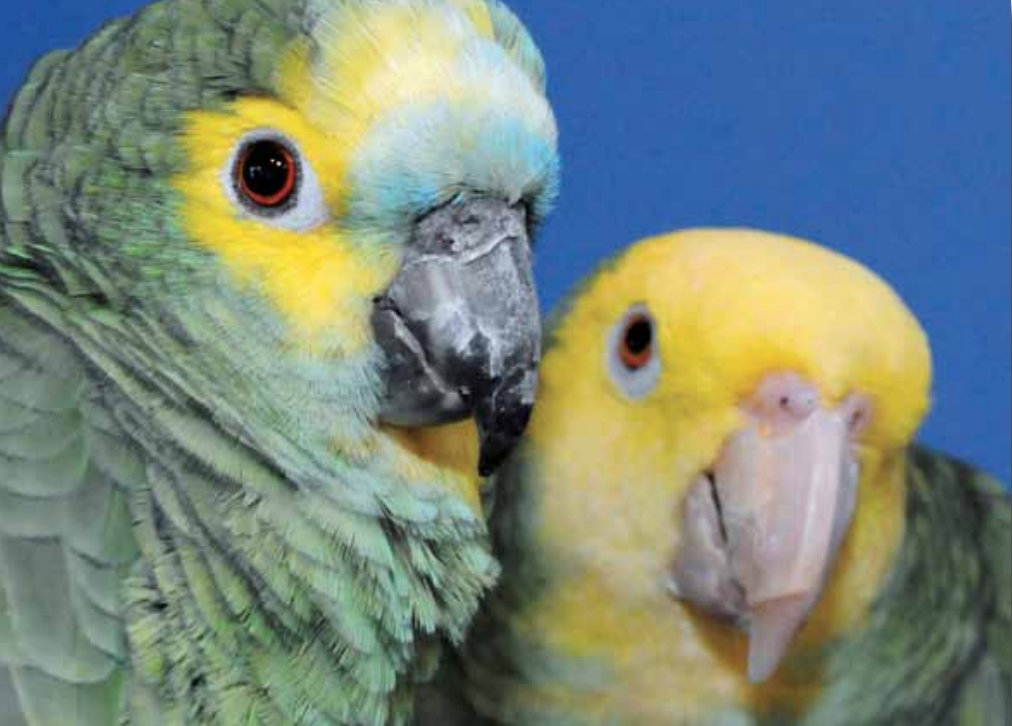
From the Summer 2014 Edition of PsittaScene Magazine. Get a free subscription with your WPT membership.
Why do you feel it is important for people to be realistic about how long they might be in the life of a parrot?
Phoenix Landing works with a lot of people, a lot of birds, and in many geographic areas. We don’t know too many people who have had a (large) parrot for its entire life (assuming the parrot lives as long as it should), so clearly those birds have required a new home through adoption.
One of my least favourite terms often applied to parrots is “forever home”. It is just unrealistic, especially for the long-lived parrots like Cockatoos, Amazons and Macaws, who can live to be 50 – 80 years of age depending on the species. Even parakeets can live 15-20 years! People may start with the best of intentions, but if a parrot is properly cared for, most people do not have the time, money, health or interest to care for it “forever.”
Another term that is usually applied to birds looking for a new home is “rescue”. This is a highly charged and negative term that implies the parrot has been a victim of neglect or abuse. Most parrots simply need a succession of homes, and all birds deserve for those to be good ones. This is why we must all work together to make adoption a positive way to bring a bird into the family
When someone is ready to adopt, do you ask them to acknowledge the reality that another home may be required in the future?
Yes! We build this into both our application and final adoption contract. Adopters are asked to keep in contact with us, so that when their adopted bird needs their next new home, we can ensure that it is also a good one. This keeps the bird under the protective umbrella of Phoenix Landing, and our hope is that they will go from good home to good home for their entire lives. In fact, because we’re so rigorous about this, we are now rehoming more parrots already in our own system than taking in newer ones! We are fiercely dedicated for life to the birds that have already come into our care.
What skills do you suggest for perspective adopters?
I think the most valuable skill is a person’s willingness to learn. No one is perfect, no one gets it right all the time. We want people to stay motivated and interested in improving the quality-of-life for the parrot(s) in their care.
One of our main goals is helping people to have proper expectations of a parrot. For example, if someone puts their hands inside a macaw or quaker’s cage, the bird is likely to respond with behaviours that say “no, this is my personal space and I’ll do anything to defend it.” To which the general response tends to be, “this is an aggressive bird and I must get rid of it.” The simple fix is to let the bird out of the cage before servicing it or trying to interact. We help people understand how to look at life from the parrot’s point of view, so they can build a successful long-term relationship that works for both the people and, most especially, the bird.
We also look for people that understand taking care of a parrot is different from dogs and cats. Birds are unique, and often have more extensive needs than other pets. For example, our adoption fees are nothing compared to the annual costs of avian healthcare, toys and enrichment, healthy food, physical space (cages, play areas, aviaries), emergencies, etc. For larger birds, this can get be quite costly, so adopters are asked if they are financially able to make a commitment to a parrot.
And above all, patience! Learning to live successfully with a parrot can be very challenging. Problems are not solved overnight, but in most cases, a solution can be found. Building trust is the key ingredient to living harmoniously with a prey animal, and many people are not patient enough to build this kind of relationship
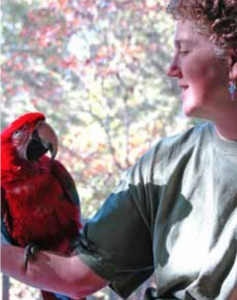
Ann Brooks is one of the founders of Phoenix Landing (phoenixlanding.org), a nonprofit avian welfare organization in the United States. Established in 2000 and active in several east coast states, Phoenix Landing has developed into an extensive network of volunteers to facilitate a foster and adoption program for parrots, and hosts a robust education program about parrot care to improve the quality of life for parrots in captivity. Ann’s goal is to ensure that Phoenix Landing is sustainable for decades to come, so that parrots will always have a safe place to land.
More from the World Parrot Trust
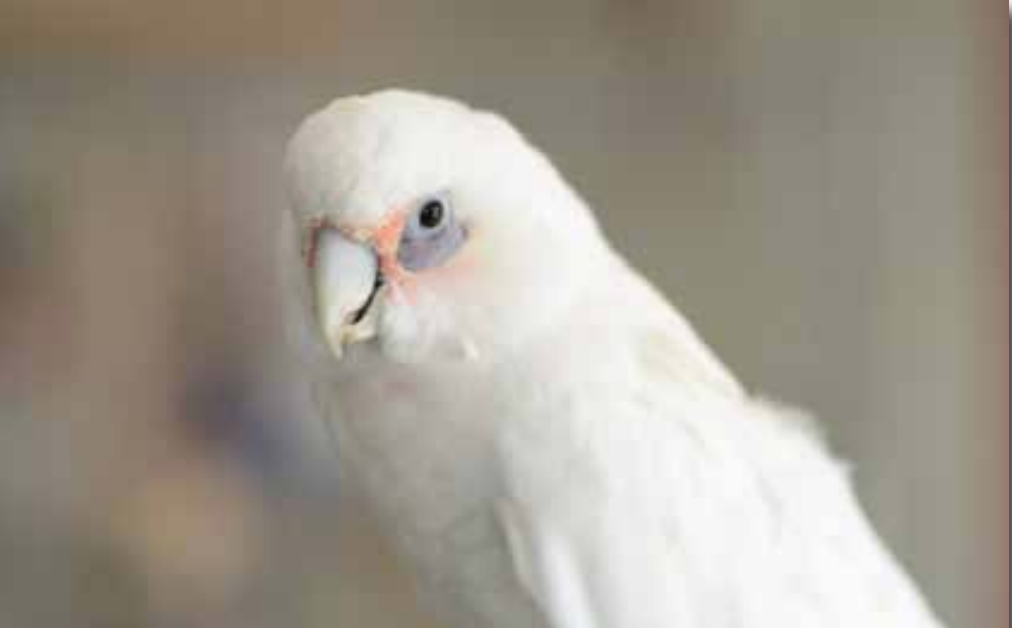
Parrots shown here are some of the many available for adoption at Phoenix Landing.
Living with a parrot can be challenging, and requires dedication.
Problems are not solved overnight, but in most cases a solution can be found.
A common misconception is a parrot that has previously bonded with a person will never bond with another caregiver. What do you say to that?
Parrots are extremely adaptable, resilient and intelligent, they have evolved this way in order to avoid predators and to forage for food. In the wild, they either live in large flocks or quickly find a new mate if needed – most species tend to not live alone. If a bird has developed a social relationship with a human family, there is absolutely no reason why that bird shouldn’t find success with another family. Most of the birds that come to Phoenix Landing are from loving homes where it is just no longer possible for them to stay; but even true “rescue” birds are likely to adapt if given an opportunity to thrive. I have yet to meet a parrot that was not adoptable, there is usually an appropriate family for each and every one. Overall, birds in good homes deserve to sustain their quality of life; birds in neglect and misery deserve to find a better place.
If someone would like to adopt but don’t have access to Phoenix Landing directly, how might people find reputable organizations?
In the U.S., I would search the Internet for an organization in your area, or check with a local avian vet’s office. Unfortunately, birds are now showing up in greater numbers at shelters as well. There are most certainly adoptable birds in your area.
Adoption needs to be one of the first things people consider when looking for a parrot, because almost every bird will need a succession of good homes. Parrots are resilient, adaptable, complex and capable of adjusting well to change. No matter where someone acquires a bird, the most important questions are: will they have proper expectations of that bird, and will they make every interaction a positive one that works for the parrot as well!
This article was originally published Autumn 2014 in PsittaScene magazine
© Copyright 2018 World Parrot Trust. All rights reserved.
